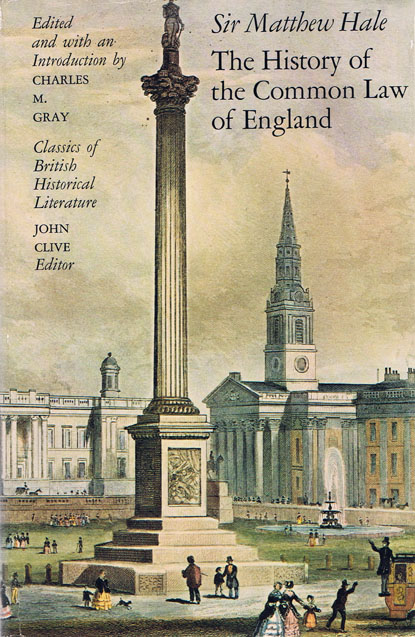
Out of Print
Sir Matthew Hale's History of the Common Law is generally recognized as the first book with any pretense to be a comprehensive account of the growth of English law. A landmark in a historiographical tradition, it stands out all the more because it was not rapidlysuperseded.
It was printed three times (1713, 1716, and 1739) virtually as it stood in manuscript, and numerous times thereafter with various editorial additions; and it was essentially the only precedent for the great late nineteenth- and twentieth-century body of explicit English legal history.
"What W. S. Holdsworth, standing on the shoulders of F. W. Maitland, achieved in thirteen volumes of his History of English Law," Charles Gray writes, "Hale first adumbrated."The preeminence of Hale's work as history is enough to place it securely among the classics of British historical literature. Yet it is all the more fascinating as a document of the complex intellectual transformation of the seventeenth century. In Professor Gray's view, Hale was presenting a historically realistic alternative to Sir Edward Coke's veneration for a mythical English past. Hale was, in effect, allowing for legitimate legislative alterations of the British constitution, developing a fundamental distinction between ordinary law, which could be changed, and constitutional law, which was not to be tampered with.
The modern understanding of how a political society can endure and yet progress is central to a proper interpretation of Hale's History. At the same time, Professor Gray argues, Hale was attempting to defend the "mixed" constitution against the position of Thomas Hobbes, to assert elements of permanence in political and legal society against the contention that judges were no more than the executors of the living community's legislative judgment.
How was it possible, Professor Gray asks, for Hale to conceive of such a book? And why, in a sense, was it more possible to conceive than to execute? In pursuing these questions, Charles Gray discusses the ways in which the History serves purposes other than "mere history"—the senses in which it is a document in the history of jurisprudence and political thought; the ways in which it testifies to changes in intellectual style and methods; and the manner in which it is expressive of the personality and experience of the author.
Matthew Hale was able to embark upon a general history of English law partly because he lived at the end of a period during which thinking about the law in a historical dimension had flourished exceptionally. The magnitude of the seventeenth-century transformation in science and philosophy, religion and political theory, is well recognized.
Still, Hale's History of the Common Law of England is, Professor Gray concludes, "possibly the most important book to come to terms with if the legal-historical aspect of`cultural revolution' is to be more deeply understood."